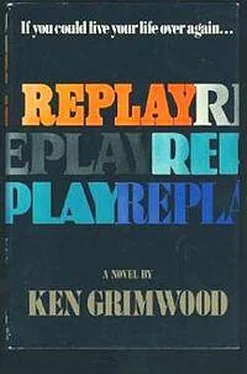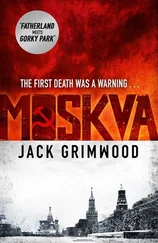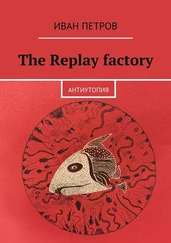"I’ve already explained it as clearly as I’m able."
"This business about reliving your life—" His cool gaze took in Pamela. "Your lives. You can’t expect us to believe that, can you?"
"You don’t have any choice," Jeff said matter-of-factly. "Neither do we. It’s happening; that’s all we know. The only reason we’ve made such a spectacle of ourselves this time is because we want to find out more about it. I’ve made all this very plain before."
"I expected you’d say that."
Pamela leaned forward intently. "Surely there are government researchers who could investigate this phenomenon, help us find the answers we’re looking for."
"That’s not my department."
"But you could direct us to them, let them know you’re taking us seriously. There are physicists who might—"
"In exchange for what?" Hedges asked, flicking a long ash from his cigarette.
"I beg your pardon?"
"You’re talking about a commitment of funds, manpower, laboratory facilities … What would we get in return?"
Pamela pursed her lips, looked at Jeff. "Information," she said after a moment’s pause. "Advance knowledge of events that will upset the world’s economy and lead to the deaths of thousands of innocent people."
Hedges crushed out the cigarette, his keen blue eyes riveted on hers. "Such as?"
She glanced at Jeff again; his face held no expression, neither approval nor admonishment. "This thing in Libya," Pamela told Hedges, "will have disastrous, far-reaching consequences. The man in charge of the junta, Colonel Qaddafi, will appoint himself premier early next year; he’s a madman, the most truly evil figure of the next twenty years. He’ll turn Libya into a breeding ground, and a haven, for terrorists. Dreadful, unimaginable things will happen because of him."
Hedges shrugged. "That’s awfully vague," he said. "It could be years before those kinds of assertions are proven or disproven. Besides, we’re more interested in events in Southeast Asia, not the ups and downs of these little Arab states."
Pamela shook her head decisively. "You’re wrong there. Vietnam is a lost cause; it’s the Middle East that’ll be the pivotal region during the next two decades."
The man looked at her thoughtfully, fished another cigarette from his crumpled pack. "There’s a minority faction at State that’s expressed just that opinion," he said. "But when you claim our stance in Vietnam is hopeless … What about the death of Ho Chi Minh day before yesterday? Won’t that weaken the resolve of the NLF? Our analysts say—"
Jeff spoke up. "If anything, it’ll strengthen their determination. Ho will be all but canonized, made into a martyr. They’ll rename Saigon after him, in—once they’ve taken the city."
"You were about to name a date," Hedges said, squinting at him through a haze of smoke.
"I think we should be somewhat selective about what we tell you," Jeff said carefully, giving Pamela a cautioning look. "We don’t want to add to the world’s troubles, just help it avert some of the clear-cut misfortunes."
"I don’t know … There are still a number of doubting Thomases in the department, and if all you can offer are evasive generalities—"
"Kosygin and Chou En-lai," Jeff declared forcefully. "They’ll meet in Peking next week, and early next month the Soviet Union and China will agree to hold formal talks on their border disputes."
Hedges frowned in disbelief. "Kosygin would never visit China."
"He will," Jeff asserted with a tight smile. "And before too long, so will Richard Nixon."
The March wind off Chesapeake Bay stirred the light rain into a fine, chill mist, stopped the scattered droplets in their fall, and whipped them this way and that, into an atmospheric microcosm of the whitecaps that slapped across the choppy bay. Jeff’s hooded slicker glistened blackly in the omnipresent moisture as the cold, clear drizzle lashed and trickled invigoratingly across his face.
"What about Allende?" Hedges asked, trying without success to light a sodden Camel. "Does he stand a chance?"
"You mean despite your people’s mucking about in Chilean politics?" It had long since become obvious to Jeff and Pamela that Russell Hedges had only the most tenuous connection to the State Department. Whether he was CIA or NSA or something ; else entirely, they didn’t know. It didn’t really matter; the end results were the same.
Hedges gave one of his ambiguous half-smiles, managed to get j the cigarette going. "You don’t have to tell me whether he’s actually going to be elected or not, just whether he stands a reasonable chance."
"And if I say he does, then what? He goes the way of Qaddafi?"
"This country had nothing to do with the Qaddafi assassination; I’ve told you that time and again. It was purely an internal Libyan affair. You know how those third-world power struggles go."
There was no point arguing about it with the man again; Jeff knew damned well that Qaddafi had been killed, before ever taking office, as a direct result of what he and Pamela had told Hedges of the dictator’s future policies and actions. Not that Jeff mourned the death of a bloodthirsty maniac like that, but it was widely assumed that the CIA was linked to the murder, and those well-founded rumors had led to the creation of a previously nonexistent terrorist outfit called the November Squad, headed by Qaddafi’s younger brother. The group had vowed a lifetime of revenge in the name of its slain leader. Already, a massive petroleum fire raged out of control in the desert south of Tripoli, where three months earlier the November Squad had blown up a Mobil Oil installation, killing eleven Americans and twenty-three Libyan employees.
Chile’s Allende was no Qaddafi; he was a decent, well-meaning man, the first freely elected Marxist president in history. He would die soon enough as it was, and probably at American instigation. Jeff had no intention of hurrying that shameful day.
"I have nothing to say about Allende one way or the other. He’s no threat to the United States. Let’s just leave it at that."
Hedges tried to draw on the soggy cigarette, but it had gone out again, and the wet paper had begun to split. He threw it off the wharf and into the restless water with dismay. "You had no such compunctions about telling us Heath will be elected prime minister in England this summer."
Jeff eyed him sardonically. "Maybe I wanted to make sure you didn’t decide to have Harold Wilson shot."
"Goddamn it," Hedges spat out, "who set you up as the moral arbiter of U.S. foreign policy? It’s your job to supply us with advance information, period. Let the people in charge decide what’s important and what’s not and how to handle it."
"I’ve seen the results of some of those decisions before," Jeff said. "I prefer to remain selective about what I reveal. Besides," he added, "this was supposed to be a fair trade. What about your end of the bargain—is any progress being made?"
Hedges coughed, turned his back to the wind off the bay. "Why don’t we go back inside, have a warm drink?"
"I like it out here," Jeff said defiantly. "It makes me feel alive."
"Well, I’ll be dead of pneumonia if we stay out here much longer. Come on, let’s go in and I’ll tell you what the scientists have had to say so fart"
Jeff relented, and they began walking toward the old government-owned house on the western shore of Maryland, south of Annapolis. They’d been here for six weeks now, conferring on the implications of Rhoqesian independence and the coming overthrow of Cambodia’s/Prince Sihanouk. At first, he and Pamela had regarded their stay here as something of a lark, a vacation of sorts, but Jeff was growing increasingly concerned over the detailed grillings by Hedges, who apparently had been assigned to them as a permanent liaison. They’d been careful not to say anything they felt could be put to harmful use by the Nixon administration, but it was becoming harder to know where to draw the line. Even Jeff’s equivocal "no comment" about next fall’s elections in Chile might be rightly interpreted by Hedges and his superiors as an indication that Allende would, in fact, win the presidency; and what sort of covert U.S. action might that assumption provoke? They were walking a dangerous tightrope here, and Jeff had begun to regret they’d ever agreed to these meetings at all.
Читать дальше












